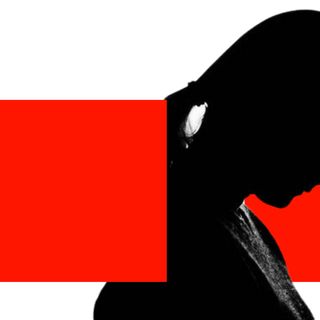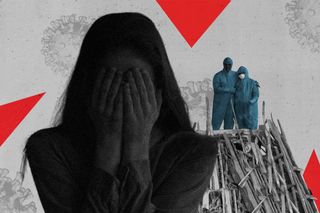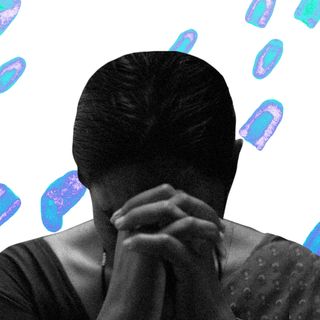
‘Survivors’ Guilt’ Is Hitting Covid19 Survivors In India, Complicating Their Grieving
“Maybe I didn’t really need to be hospitalized as much as someone else. I’m glad I did, but it just feels unfair and wrong.”

For Kirti, the last two months have been an “absolute nightmare.” Her voice is strained, her tone, flat. The 22-year-old is recovering from a Covid19 infection — a wave that hit her parents and brother at the same time. It was her father who needed the most care. The family scurried to arrange oxygen and medicine and a hospital bed for him in Delhi; then Kirti got sicker and needed to be admitted,too.
Her days in the hospital were a blur of nausea and medication, but what bothered her the most was that she shouldn’t have been there in the first place — in the hospital, taking up a bed, using up oxygen, “hoarding” medicine.
“I kept feeling that I didn’t need it — someone’s life could be saved with this,” she says. That guilt is hard to shake off, she adds, her words clamoring for breath. “Maybe I didn’t really need to be hospitalized as much as someone else. I’m glad I did, but it just feels unfair and wrong. It’s scary.”
The guilt Kirti refers to is easy to understand, but hard to explain — it looks different for everyone and is a response to different factors. Survivors’ guilt, most psychologists note, is not a medically diagnosable condition, but it manifests emotionally and physically among people who survive a traumatic event; guilt has been framed mostly in reference to war veterans, survivors of natural disasters, accidents — and illnesses. The experience of the pandemic is evincing a similar response in some people, as they reckon with the grief of a crisis that’s still unfolding.
“This stress can’t be relieved,” Kirti says. “Very dear people are dying, and there’s no turning away from it.”
*
She’s right. A nation is gasping for air, dying on streets, fighting for dignity at least in death. And watching it happen is an odd feeling, one of shame and guilt and helplessness — to get to live, while others die.
“If a person has been able to survive a crisis or an event, there is a guilt that I could survive this and the other person could not,” says Manvi Sharma, a counseling psychologist with Therapize India, explaining what connects ‘surviving’ to ‘guilt.’
“There are a lot of whys with survivors’ guilt — why me? Why not me? And these whys are not always irrational; they can also be rational in nature.” One thing to know about emotions, Manvi says, is that they co-exist. A person can feel grateful for surviving — and grief for what’s happening. “Emotions are not linear or unitary,” she says, which makes the guilt inconspicuous on some days, and overbearing on others.
Related on The Swaddle:
When Talking About Death Is Taboo, How Can Grieving People Heal?
Experts note the term ‘survivors’ guilt’ has its roots in the Holocaust. “There are those, for example, who do not allow themselves to forget but instead are compelled by an inner sense of duty to ‘remember’; they deliberately deny and forbid themselves any joy in living. There are others who want to forget, but cannot,” Ruth Jaffe explains. Survivors’ guilt was also documented among veterans of the Vietnam War, survivors of 9/11, natural disasters, and other accidents. It is reductive to liken any two traumatic events, but the overarching feeling among those who escape death is confusion about why they get to live. In that sense, guilt is akin to a trauma response — instinctive to some, inexplicable on the whole. Does the pandemic, then, classify as a trauma? A growing body of research is drawing this conclusion: Covid19 “can be understood as a traumatic stressor event capable of eliciting PTSD-like responses and exacerbating other related mental health problems,” such as anxiety and depression.
Guilt comes from a place of grief. A possible function of survivors’ guilt may be to try and gain control over a situation that seems utterly out of our control. “Guilt suggests that you did something wrong,” says Mary-Frances O’Connor, Ph.D., associate professor in the department of psychology at the University of Arizona, in the U.S. “And it may almost be more comforting to feel that you are being punished, rather than to feel that death can come randomly, creating a completely unpredictable world.”
Loss of life, loved ones, and parts of ourselves have made grief commonplace, but each yearning is unique — making the resultant guilt vary in shape and form, too. The feeling of guilt is a perception of wrongdoing, coupled with social withdrawal, purposelessness, and numbness. Physically, it takes the form of exhaustion, changes in appetite, a decrease in pleasurable activities, insomnia, headaches. Extreme cases of trauma-related guilt manifest as depression, post-traumatic stress disorder, and even suicidal behavior.
“We are still in the middle of coping with [grief]. There will be some time for the stress to reduce before we make an assumption,” says Christy Denckla, a researcher at the department of epidemiology, Harvard T. H. Chan School of Public Health, noting how much still is unknown around pandemic-related survivors’ guilt. “It’s nearly impossible to take stock of the impact, at least individually, of the pandemic.”
But guilt doesn’t limit itself to people who have survived Covid19 or have suffered a personal loss. “Guilt has many inspirations,” adds Denckla. “It’s a sense of privilege — for example, having kept a steady job during the pandemic — when other people have lost jobs and experienced financial ruin. It’s not necessarily that individual’s fault.”
In other scenarios, individuals who may have become infected themselves, and then had family members pass away, may suffer from a gnawing feeling of wrongdoing. “This is an extremely difficult situation because the individuals can have to grapple with the potential of whether they infected their family members,” Denckla says. Because the nature of the pandemic is highly contagious, it is impossible to ascertain the source of the infection; the answer notwithstanding, the mere possibility of making someone ill can be sickening in itself. There’s also a subset of guilt — gratitude guilt. Surviving makes people want to count their blessings, but this too leads to guilt about being able to do this in the first place. It’s the shorter end of the stick, no matter which side you pick.
“This can certainly complicate grieving,” Denckla says.
Within the oblique shadow of loneliness, guilt also feels all-consuming. Preliminary research reveals haunting clues about the emotional and social costs of isolation: young adults and teens are the hardest hit in what experts call a “loneliness epidemic.” And prolonged isolation during the second wave, especially in India, fuels a downward spiral of shame — particularly when the scale of mourning people are experiencing is unprecedented. “You are left alone with your thoughts and fear. The dead are left alone at the crematorium. The survivors left without a closure,” Jyotsna Mohan writes of her “guilt of the living” in Gulf News. Handling these emotions feels like trying to balance a big tower of Jenga — the slightest misstep can bring everything down.
For some people, the guilt also breeds purposelessness. Mandeep Singh, a 23-year-old postgraduate student, spent the last few months working on his dissertation, staying safe along with his family. But the guilt feels “all-consuming at times,” he says. “The hopelessness is probably built on the arbitrariness of death,” he says. “While there is massive guilt and pressure of being productive, utilizing my time and resources, to sincerely do my job and contribute whatever I can, there is an inescapable conundrum. How am I supposed to work or write a paper when my country is burning outside every day?”
The pathos and loss of control are evident on social media: Facebook, Twitter, Instagram feeds carry pleas for help as people realize they may be on their own. The large-scale neglect by the Indian government is also exacerbating the feeling of responsibility and guilt for many; the sense of abandonment colludes with grief. Loss comes every day from multiple places; hope, which felt like it was in short supply last year, is now fully dried out.
Arjun Tandon, 25, a junior doctor at a government hospital in New Delhi, lost five Covid19 patients with comorbidities in his first week. There was an oxygen shortage even back in February, he explains. “I’m in depression for sure. The number of calls I get every day for oxygen, medicines, beds, ICU, it’s a lot to take in,” he says.
Other medical professionals, such as those working in Covid ICUs, report similar feelings of frustration and powerlessness, as deaths and loss rap on doors relentlessly. Having to choose who gets to live and who dies also results in what experts call a “sideline guilt.”
“You feel so helpless,” Tandon says. “I’m literally crying every single day because I’m so helpless because I can’t help everyone.”
Related on The Swaddle:
The National Institute of Mental Health & Neuro Sciences (NIMHANS) in Bengaluru, which runs a 24×7 helpline for mental health, recorded a 40% increase in distress calls in the month of April. “Some people are in distress because they are feeling guilty of not being able to cremate, get the one final glance, or bid a goodbye to their dear ones,” K. Sekar, head of the department of psychosocial care and disaster management at NIMHANS, told The Print.
Sekar says they are telling survivors: “there is no need to feel guilt. All these things are beyond your control. Whatever is happening around us is a natural phenomenon due to the abnormal situation around you.”
Why do people feel guilt and shame over something not in their control? “Guilt is not necessarily a logical emotion,” Denckla explains. “No emotion is logical, really, but they are real.” It stems from a feeling of despair, shame, anger, helplessness, loss of control. Which is not to say everyone experiencing these emotions is living through survivors’ guilt — or someone experiencing survivors’ guilt necessarily has to feel these emotions.
*
Denckla specializes in grief, loss, and bereavement. One takeaway, she notes, is to identify guilt and grief separately, because “guilt can really get in the way of grieving and bereavement.” This often happens in one of two ways: guilt and shame induce a sense of avoidance in people — attempts to manage guilt involve wanting to avoid the stimulus that makes people feel guilty.
“People might avoid someone who’s experienced a very traumatic loss, as part of guilt can interfere in reaching out to other people and providing support because there is that sense of survivor’s guilt. They’re guilty in the sense that it didn’t happen to them,” she says.
Guilt also impedes the healing process when experiencing bereavement or grief. “Grief is a prolonged experience that lasts for years and sometimes never really goes away after the loss of a loved one. So, experiencing guilt or survivor’s guilt can get in the way of experiencing moments of happiness and celebration.” Even avoiding this guilt through unhealthy behavior — such as overconsumption of media, excessive distraction, social withdrawal, alcohol use, etc. — only serves to prolong the guilt, says Denckla.
Arguably, guilt is also transformative in nature and can trigger constructive action — such as doing relief work during the pandemic, raising awareness, being informed, and amplifying critical voices. Rage and frustration are churning the wheels of an advocacy cycle, one that is helping millions of people. But experts warn of a caveat in channeling guilt: it can also turn into “survivors’ pressure,” Mary-Frances O’Connor told Vox. If the pressure to act or take control gets in the way of recovery or of addressing grief, it can become its own challenge.
Denckla suggests naming this guilt, voicing it, and addressing it in a sentient way. “Giving grief a voice allows people to have a language and a community in which to express emotion, and to express feelings and to express loss. And these expressions can then alleviate and challenge some guilt. Because when grief isn’t expressed or when it is avoided, sometimes guilt can then fester.”
The pandemic has probed and prodded the stigma around grief and loss. “Openness, discussion, education, and infrastructure in language, these are all helpful platforms to discuss feelings and to discuss grief, which can prevent guilt,” Denckla adds.
Manvi Sharma, the psychologist, concurs. “Each one of us has to ask: how can we, or do we want to, show up for our own selves? And for a loved one? In case the resources people have been using aren’t not supporting me enough during these unprecedented times, reach out to a mental health professional or support groups for a sense of community,” Sharma says. A social network, which feels harder than ever to sustain during a pandemic, can assuage some of that guilt.
She suggests professional therapy or participation in grief circles can help anchor people’s experiences and help them acknowledge a sense of decay. These grief groups also serve as an alternate ritual to grieving, creating a sense of community that is currently waning. “My clients and I have been acknowledging the effect of the external environment, we are all in this pandemic. This acknowledgment supports clients in validating what and how they are feeling.”
“I wish I had some techniques to share,” Sharma adds. “There aren’t any techniques, honestly. We’re all navigating differently. Grief is looking different for every individual and even every community.”
How does one know they need professional help? Manvi explains it like this: If I am down with fever, I might go for a Crocin, then some home remedies if that doesn’t work; I might have to see a physician to learn whether it’s just fever, or something more than that. “So, I guess the same thing applies to mental health, too. When you think your personal resources, in the form of your mental peace or support from loved ones, seems to be depleting, reaching out to [a professional] helps.”
Other ways include reaching out to people, taking them into confidence, reminding your loved ones that they matter and are cared for. As much as this is a way of managing guilt and grief, it also marks a new-age social media etiquette normalized during the mental health crisis, a public process for other survivors.
“Coming to terms with grief and confronting grief can sometimes teach us what is important about living and can deepen appreciation for life,” Christy Denckla says. “Guilt can be painful but very transformative because paradoxically, confronting death teaches us what is special about being alive.”
If you or anyone you know is anxious, depressed, upset, or needs to talk, please refer to this list and this resource of affordable and accessible mental health professionals.
Saumya Kalia is an Associate Editor at The Swaddle. Her journalism and writing explore issues of social justice, digital sub-cultures, media ecosystem, literature, and memory as they cut across socio-cultural periods. You can reach her at @Saumya_Kalia.
Related


Mental Illness Is a Common Comorbidity of Tropical Disease. How Can India’s Healthcare System Treat Both?
